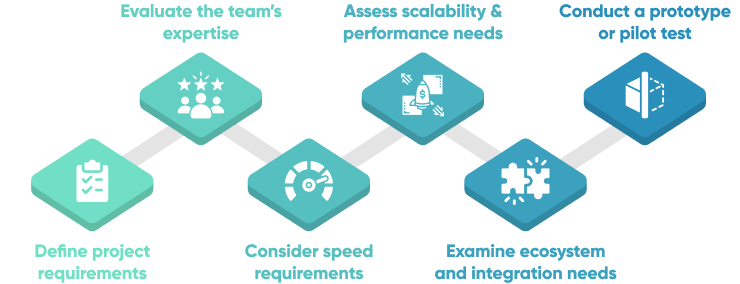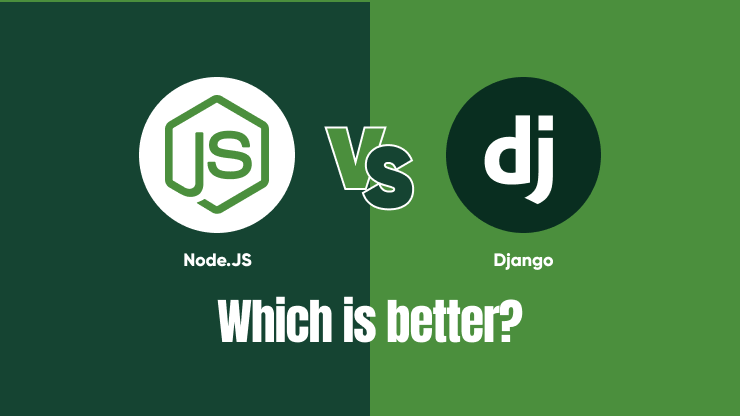Django and Node.js are leading choices in the web development space, collectively used by over 50% of developers. But choosing the right framework for your 2024 project requires careful consideration.
Django is a high-level Python framework designed for rapid development and clean, pragmatic design. On the other hand, Node.js is a powerful JavaScript environment optimized for building scalable network applications. In this article, we'll explore both frameworks in-depth, highlighting their strengths and weaknesses to help you make an informed decision for your next web development project.
Understanding Django
Django is a high-level Python based web framework that is designed to help developers build scalable web applications quickly and efficiently. It is an open-source web framework known for its simplicity and ease of use. It was created by Adrian Holovaty and Simon Willison in 2003 and was released to the public in 2005.
Django comes with a number of features that make it a popular choice among developers, including:
- ORM (Object-Relational Mapping): Django includes a robust ORM that serves as one of the key database management tools, enabling developers to manage database interactions using Python code. This simplifies the database handling process and minimizes the need to write extensive SQL code.
- Django REST framework: Django provides a toolkit for building APIs, simplifying the development of complex APIs with support for RESTful principles and traditional HTTP methods, efficient data serialization, and strong authentication systems.
- Admin interface: Django comes with a built-in admin interface that allows developers to manage the application's data. This interface is customizable and can be used to perform a variety of tasks such as adding, editing, and deleting data.
Pros of Django
When deciding between Django and Node.js, it’s important to consider each of these frameworks’ pros and cons. Let’s start by looking at the pros of working in Django:
- Implemented in Python: Utilizing the popular and versatile Python programming language, Django is able to offer developers an extensive library of essential libraries and tools for building web applications.
- Mature framework: The flexible and powerful Django framework has been in use for over a decade, so it benefits from a large user community and maturation over time.
- Provides a robust set of features: Django provides a wide range of features, including content administration, ORM, a templating system, an object-relational mapper, and much more.
- Batteries included: Django provides all the necessary components right out of the box, allowing for rapid web app development.
- Highly scalable: With Django, you can build highly scalable apps and websites that can be easily expanded in features or resources as needed.
- Secure platform: Django offers built-in security features to protect against malicious attacks, such as SQL injection, cross site scripting, and clickjacking.
- Rapid development: Django’s architecture enables developers to work on different components concurrently and then easily integrate them later.
Cons of Django
While Django has a number of advantages, it also has some drawbacks that backend development teams should be aware of. Some of the cons of building web applications with Django include:
- Complexity: Django's comprehensive features and structure can lead to a steeper learning curve compared to the more modular Node.js.
- Not suitable for smaller projects: The large scope of the Django web development framework can be overwhelming for smaller projects.
- Primarily a backend framework: Django is primarily designed for backend web development, without much built-in frontend web development functionality.
Understanding Node.js
Now let’s take a deeper look at Node.js, which is a popular open-source server-side Javascript runtime environment built on Chrome's V8 JavaScript engine. It allows developers to build scalable, high-performance applications using JavaScript. Some key features include:
- Asynchronous I/O: Node.js uses an event-driven, non-blocking I/O model that makes it ideal for building real-time, data-intensive applications. It can handle a large number of concurrent connections with high throughput.
- Cross-platform: Node.js can run on various operating systems such as Windows, macOS, and Linux. This makes it easy for developers to write code on one platform and deploy it on another.
- NPM: Node.js has a built-in package manager called NPM (Node Package Manager) that allows developers to install and manage third-party packages easily. There are over a million packages available on NPM, making it one of the largest package repositories.
Pros of Node.js
Now let’s look at some of the reasons why many developers choose Node.js for modern web application development:
- Fast processing: The Node.js event loop handles multiple requests quickly, allowing for seamless scaling.
- Scalable for microservices: The Node.js architecture is ideal for microservices.
- Less complex than Django: Node.js allows for flexible problem solving.
- Highly scalable: Node.js is capable of handling changes in the data layer with ease and supports larger applications.
- High performance: Node.js is single-threaded and event-driven, making it perfect for real-time applications.
- Full-stack development - Node.js is suitable for both front-end and back-end development.
- Large community: Node.js has a large and active community of developers who contribute to its development and maintenance. This means that there is a wealth of resources available for learning and troubleshooting.
- Real-time applications: Node.js is ideal for building real-time applications such as chat applications, online games, and collaboration tools. Its event-driven, non-blocking I/O model allows for real-time data transfer.
Cons of Node.js
As with Django, Node.js is not suitable for every project or scenario. Here are some of the main disadvantages to working with this development framework:
- Unstable API: Node.js has faced criticism for frequent changes to its API that aren't backward compatible. This instability can lead to unexpected behavior in applications, requiring developers to frequently update their code to adapt to new API versions
- Lack of structure: Without a defined framework structure, it can be harder to maintain consistency and scalability in larger projects, potentially leading to disorganized and inefficient codebases.
- Requires additional tools: Node.js requires additional tools and frameworks to manage complex application states, which might complicate scalability efforts compared to Django's more monolithic but feature-rich environment.
6 Steps to Make the Right Decision - Django vs Node.js
When it comes to choosing between Django and Node.js, for some projects the choice may be quite clear. But for others, there may be many factors to consider. In this section we’ll walk through 6 steps to help you make the right decision, based on your exact project.

Define project requirements
To make the right decision, you’ll need a very clear scoping of the project. Take the time up front to define your software project requirements.
Consider the specific functionalities your project demands. What features and functionalities are essential for your project? Is real-time functionality, like chat features, crucial? Or do you need a robust admin dashboard? Is the project expected to handle vast amounts of data or high traffic? Do you foresee rapid scaling needs in the near future?
How to decide:
- If your project requires intricate data management, business logic, or an extensive admin interface, then consider Django.
- If real-time interactions, data streaming, or immediate scalability are paramount, then consider Node.js.
Read More: 7 Easy Steps to Nail Your Software Requirements Specification
Evaluate the team’s expertise
Another important consideration is the development team's expertise in Python (for Django) or JavaScript (for Node.js), which can significantly impact project speed and quality.
Additionally, team scalability and the ease of onboarding new members are crucial. If you expect to grow your team, consider the local or global availability and cost of hiring talent skilled in your chosen technology. This could make Django or Node.js more attractive, not only technically but also from a hiring perspective.
How to decide:
- If your team has a stronger foundation in Python or if you’re able to find skilled Python developers within your budget, then consider Django.
- If your team is well-versed in JavaScript or if you’re able to hire skilled JavaScript talent within budget, then consider Node.js.
Read More: 7 Key Elements of Building Software Development Teams
Consider the development process & speed requirements
A pivotal element to evaluate when deciding on a framework is the development process and the speed of execution required for your project. Django, known for its "batteries-included" philosophy, is designed to facilitate a more streamlined development process. Its foundational tools, including the built-in ORM and the admin interface, can expedite tasks, making it particularly suited for projects aiming for quick MVPs or prototypes.
Conversely, Node.js, often paired with frameworks like Express.js, presents a slightly different picture. While it may demand a bit more groundwork at the outset, this initial investment is offset by the flexibility it offers down the line. Node.js rides on the ubiquity and dynamism of JavaScript, allowing developers to fine-tune and customize components more freely. This can be a particularly strong fit for projects that demand custom functionalities over rapid initial setup.
How to decide:
- If rapid development, especially for MVPs or prototypes, is a priority, then consider Django.
- If a longer setup can be tolerated in exchange for greater flexibility longterm, then consider Node.js.
Read More: Software Development Planning - Perfect Project Plan in 10 Steps
Assess scalability & performance needs
When selecting a framework, it's crucial to assess your project's specific scalability and performance requirements. For applications that require I/O-bound tasks or web apps that hinge on real-time functionalities, Node.js typically stands out. Its inherent advantage comes from its non-blocking, event-driven architecture, designed to efficiently manage simultaneous operations without creating bottlenecks.
On the other hand, Django, while robust and capable of managing substantial traffic and complex workloads, may require additional considerations for projects anticipating rapid scaling or heavy real-time demands. To address these specific requirements, it might be necessary to integrate additional configurations and deploy third-party tools, such as Django Channels, to bolster its real-time capabilities.
How to decide:
- If your application requires real-time interactions or frequently handles I/O-bound tasks, then consider using Node.js
- If you're seeking a comprehensive backend framework and are prepared to integrate additional tools for swift scalability or enhanced real-time components, then Django might be your best choice.
Examine ecosystem and integration needs
When building a web application, it's essential to consider not only the immediate development requirements but also the broader ecosystem in which the application will exist. A framework's compatibility with specific libraries, tools, or platforms can drastically influence development efficiency, future integrations, and overall project success.
If your project is deeply ingrained within the JavaScript ecosystem, especially when leveraging prominent front-end libraries or frameworks such as React, Vue, or Angular, Node.js becomes the natural choice. The consistency of using JavaScript both on the client and server side can simplify the development process, reduce context switching for developers, and foster a more harmonious environment for integrations.
On the other hand, for projects seeking a backend that comes equipped with an extensive suite of built-in tools, Django offers a holistic solution.
How to decide:
- If your project is tied to the JavaScript ecosystem or relies heavily on JavaScript-based front-end frameworks, then consider Node js.
- If your project demands a cohesive backend with built-in tools and seeks seamless integration with the extensive Python libraries ecosystem, then consider Django.
Read More: 12 Dos & Don'ts of Business Web Application Development
Conduct a prototype or pilot test
In situations of ambiguity, taking a pragmatic approach can be illuminating. Developing a prototype or a specific component using both Django and Node.js provides an opportunity to directly gauge their suitability for your project. This hands-on test drive can shed light on key factors:
- The efficiency of development
- Hurdles that might arise during the process
- How intuitively each framework aligns with your project’s objectives and technical requirements
Additionally, this can be a great way to “test the waters” with an outsourcing company you want to consider working with. See how they handle the challenges of a small project, and you’ll be able to make a more informed decision about their suitability for a more long-term development partnership.
Read More: 8 Step Proof of Concept Template – Validate Your Idea Fast

Conclusion
Our web application development company will do the heavy lifting for you. We will carefully review your project requirements and guide the technology selection process between Django and Node.js.
If you’re looking for an end-to-end web application development partner, we’ll build a custom solution to match your requirements and seamlessly integrate it into your existing tech stack, delivering a business-ready web app.




![AWS Security Incident Response Plan [Practical Guide]](/uploads/aws-security-incident-response-plan.png)


![Incident Response Plan Template For Startup [SM, MD, XL]](/uploads/incident-response-plan-template.png)